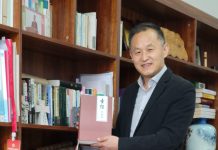
YUNNAN, China - In the quiet hills of Yunnan Province's Chuxiong Yi Autonomous Prefecture, Cao Xianping's life unfolded amidst the gentle rhythms of rural simplicity. Raised in a traditional Yi (彝) family, her childhood days resonated with the melodic tones of the Ganyi language - one of the Yi language groups and a cultural heritage passed down through generations. However, it was the arrival of Christianity that greatly impacted her life.
"I was nineteen when I personally accepted Christianity, following my mother's steadfast faith," Cao recounted. "Before that, our village knew only the ancient rituals of our ancestors and the distant chants of another religion. Embracing Christ brought me peace and a deep sense of belonging."
Cao’s journey to faith was not without its challenges. After her mother's passing, grief threatened to overwhelm her. "Losing my mother felt like losing my anchor in this life," she shared, her eyes reflecting the weight of memories. "But fellow believers supported me, praying with me through the darkest nights. It was then I realised the brevity of life and the eternal promise of heaven and glory."
Life in the countryside requires navigating two-to-three-hour bus rides along muddy village roads to access the county town. Cao’s home, with its sturdy mud walls and tiled roof, stands as a testament to resilience in an environment where modern conveniences are a distant dream.
The arrival of the Ganyi Bible (Old Testament) in 2018, two years after its completion, was a defining moment for the Yi Christians. When the He Naji Church distributed the Ganyi Old Testament and Chinese Bibles, supported by United Bible Societies (UBS), Cao was overjoyed. She recalled: “Receiving the Ganyi Bible (Old Testament) was more than a mere event; it was a spiritual awakening. The sight of so many of us receiving our own Bibles in our heart language filled me with hope and great joy. Even though I struggled with some words initially, the presence of God's Word in my heart language was illuminating."
“Receiving the Ganyi Bible (Old Testament) was more than a mere event; it was a spiritual awakening. The sight of so many of us receiving our own Bibles in our heart language filled me with hope and great joy.
"Before receiving the Ganyi Bible (Old Testament), we stumbled in spiritual darkness," Cao shared. "I longed to understand God's Word in my heart language, just like the Miao believers who have their own Bibles." With the Ganyi Bible (Old Testament) in hand, Cao's journey with Christ deepened. "I started understanding God’s Word more clearly. The stories that were once distant became vivid and alive. It strengthened my faith, and I found myself sharing the Gospel more confidently with my neighbours."
Reflecting on the impact of God's Word, Cao radiated peace. "The Lord's Prayer in Matthew 6:9-13 became my guiding light," she said with a smile. "I used to pray only for material needs. Now, I seek His kingdom first." Her transformation extended beyond spiritual growth. "Before, I was quick-tempered and proud," Cao admitted. "Now, I strive to exemplify Christ's teachings, especially in my family. Our relationships have improved, and there's newfound harmony in our home." As she juggles caring for her two children and working in the county town, Cao remains grounded in her faith. "Life hasn't become easier,” she said, “but with the Bible, I've found renewed strength daily."
Cao’s story resonates deeply with those who support Bible translation efforts. The impact of the Ganyi Bible reaches far beyond Cao's village, touching lives and transforming communities. Through her testimony, we witness firsthand the great impact of making God's Word accessible in every language, lighting up hearts and bringing hope where it's needed most.
*Chuxiong Yi Autonomous Prefecture, in central Yunnan, China, spans 29,256 square kilometers and was established in 1958. Home to the Yi ethnic group, it blends rich cultural heritage with modern development. The Yi 彝, one of China's largest ethnic minorities, mainly live in Yunnan, Sichuan, and Guizhou. Known for their vibrant culture, colourful clothing, intricate embroidery, and traditional music and dance, the Yi maintain their identity while integrating into broader Chinese society.
Photos: UBSCP
2024@UBS China Partnership







